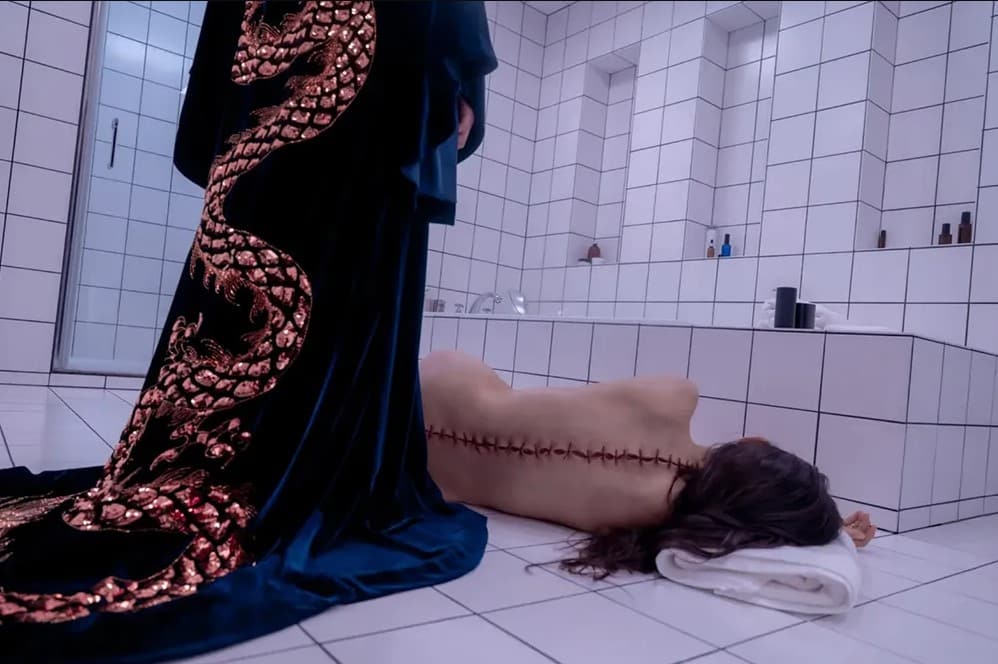Viewers of Ryan Murphy’s series Feud will know the story of Joan Crawford approaching Bette Davis to co-star in the wildly deranged 1962 classic, Whatever Happened to Baby Jane. The film was a grotesque meta-narrative: the two actresses were themselves facing a lull in their careers as they reached their mid-fifties – the calls weren’t coming in anymore. And so, they joined forces in a brutal reckoning with their own perceived insignificance, and, in Davis’s case especially, a repulsive exaggeration of women of ‘a certain age’ in Hollywood.
Now, French filmmaker Coralie Fargeat’s The Substance has brought the ghastly hag into the 21st century with a unique and gory revival starring Demi Moore and Margaret Qualley. The Substance has been dubbed with genre labels like ‘feminist’ and ‘body horror’. While these classifications are true enough, it also certainly nails the brief for ‘hagsploitation’ films like Baby Jane.
Though Sunset Boulevard (1950) served as a powerful predecessor, Baby Jane birthed a short-lived genre known as ‘hagsploitation’ (also referred to as ‘psycho-biddy’ and ‘grand dame guignol’), which had its heyday in the 1960s and 1970s. Since then, the genre has mostly laid dormant though the demand on women – especially in entertainment – to defy the ageing process has skyrocketed. Films such as Neil Jordan’s Greta (2018) and Ti West’s X trilogy (2022–2024) have certainly paid homage to this dusty corner of filmography, but never quite went all the way.
ScreenHub: Hagsploitation: whatever happened to older women on screen?
The Substance is Fargeat’s second feature and English language debut with a small but star-stacked cast including Moore, Qualley and Dennis Quaid. It tells the story of Elisabeth Sparkle (Moore), a Jane Fonda-esque Hollywood actress cum aerobics superstar, who is fired on her fiftieth birthday.
Her boss, Harvey, delivers her this news in an uncanny performance by Quaid as a caricature of a grinning and seedy entertainment executive. As Elisabeth laments the loss of her youthful relevance seated under a towering portrait of herself in a leotard, she is made an offer she cannot refuse. A nameless laboratory preys on her with a mysterious injectable ‘substance’, promising to return her to glory. This is where Sue (Qualley) comes in, emerging as Elisabeth’s perfect, younger counterpart. This substance comes with a caveat for both women: ‘the only thing not to forget: you are one.’
We live in an age where cosmetic enhancement and anti-ageing offerings have never been more abundant. And just as the celebrities who espouse them are exposed with ‘unsightly’ botch jobs resulting from their own desperation, Elisabeth deteriorates under the weight of the Faustian bargain she has made with herself.
Watch the trailer for The Substance
Fargeat knows that this mode of internal crisis for women is an eternal problem, which is why The Substance takes place in a kind of futuristic past. Aesthetically, it feels like an AI rendering of the 1980s. The message? The problems of yesterday are still present today, will persist tomorrow, and the solutions will only become more terrifying.

One particularly disturbing scene in The Substance shows Elisabeth staring at her made-up reflection in the mirror. In a moment of despair, she has made a date with an adoring fan, a dorky middle-aged man who approaches her on the street in an earlier scene. She’s all dressed up and ready to go, but in a burst of self-hatred she abandons her plans and aggressively wipes the red lipstick across her face as if to remind herself of her own hideousness.
Moore, now 61, has taken a page from Bette Davis’s book and boldly entered her third act with an ugly and uncompromising statement about ageing in the entertainment industry. Like Elisabeth Sparkle, Moore broke out as a young, beautiful ingénue in Hollywood. She made a name for herself at twenty-two with Brat Pack classic St Elmo’s Fire (1985) and has since enjoyed a diverse albeit safe career. If her movies didn’t keep her in the spotlight over the years, the tabloids certainly did.
For all the scrutiny she has faced, Moore seems imbued with a toughness and resilience that has kept her afloat where so many in her position would drown. She differs in this way from Elisabeth, who could be perceived as Moore’s shadow self were she to have taken a very different path in life. Elisabeth was gripping to hold on so tight that everything in her life contracted,” Moore recently told Interview Magazine. ‘[W]hen we let go in that acceptance of what is, we immediately create expansion”.
Elisabeth’s tale is not a new one – since Sunset Boulevard we’ve been acquainted with the plot of an ageing starlet who will stop at nothing to defy her fate. What made these films so authentically horrific was the parallel lives of actress and protagonist.It was their chance to unleash on audiences a murderous fury about being forgotten, a frenzied yet powerful insistence on their right to be seen.
Gloria Swanson, Bette Davis, Joan Crawford, and now, indeed, Demi Moore – in the best performance of her career – aren’t afraid to get ugly against the inexorable pressure to stay beautiful.
The Substance is in cinemas from 19 September 2024.
Actors:
Demi Moore, Margaret Qualley, Dennis Quaid, Hugo Diego Garcia
Director:
Coralie Fargeat
Format: Movie
Country: France, UK, USA
Release: 19 September 2024





